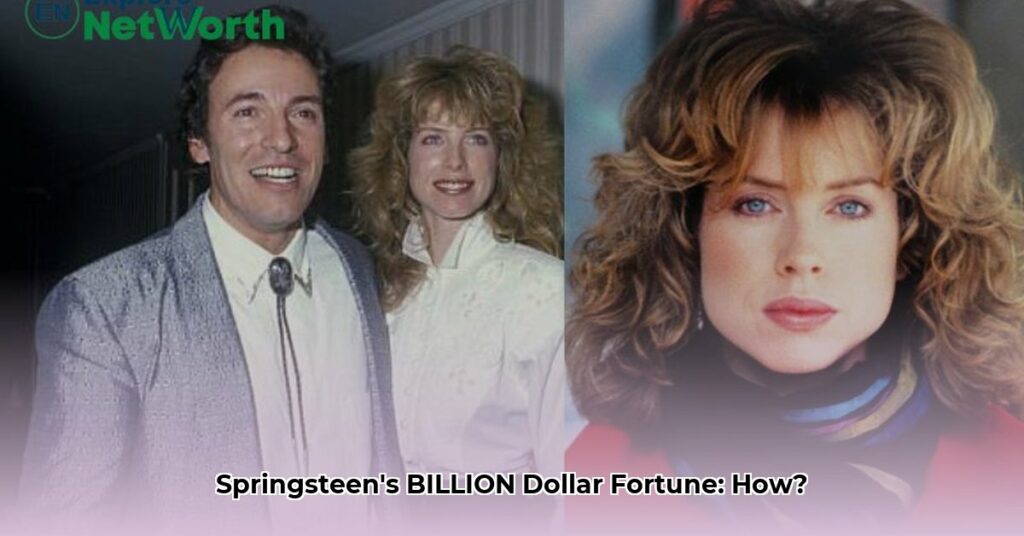Bruce Springsteen, the bard of blue-collar America, the voice of the working man, is a billionaire. Yes, the Boss. His fortune now rivals the GDP of some small nations. But this isn’t just a story about money; it’s the saga of a Jersey Shore kid who poured his soul into his music and became one of the wealthiest artists on the planet. From Asbury Park bars to sold-out stadiums, from “Born to Run” to a half-billion-dollar catalog sale, this is the story of how Bruce Springsteen built his empire, one chord, one lyric, one concert at a time.
From Freehold to Fortune: The Boss’s Rise
Bruce Springsteen’s story begins not in the gilded halls of fame, but in the working-class grit of Freehold, New Jersey. A challenging family life, marked by his father’s struggles with mental illness, likely shaped the young Springsteen, while his mother, Adele, provided a steadfast anchor. Music became his refuge, his voice, and, perhaps unknowingly, his destiny.
Early band experiences, from the Castiles to Steel Mill, served as Springsteen’s musical apprenticeship. It was in these formative years, managing the band’s finances, that he earned the moniker “The Boss”—a testament to his pragmatic nature and a foreshadowing of his future business acumen.
In 1972, Springsteen signed with Columbia Records. While his first two albums garnered critical acclaim, it was 1975’s Born to Run that launched him into the stratosphere. This album wasn’t just a hit; it was a cultural phenomenon, capturing the zeitgeist of a generation. Subsequent albums like Darkness on the Edge of Town and the global sensation Born in the U.S.A. cemented his status as a rock icon and significantly contributed to his growing wealth. Born in the U.S.A. alone sold over 30 million copies worldwide, a staggering testament to his reach.
The Sony Deal: Cashing in on a Legacy
In 2021, Springsteen made a move that resonated throughout the music industry: he sold his entire music catalog to Sony Music for a reported $500-$600 million—some estimates place the value of the sale for Springsteen’s songwriting at $150 million and the recorded music sale to Sony at $350 million. This landmark deal, the largest ever for a single artist’s catalog at the time, instantly propelled him into the billionaire ranks. It wasn’t just a sale; it was a recognition of the immense value of his life’s work. This sale reflects a growing trend of established artists capitalizing on the enduring value of their intellectual property. It also raises questions about the changing landscape of music ownership and the financial strategies of artists in the digital age.
Beyond the Catalog: Springsteen’s Diverse Income Streams
While the Sony deal undoubtedly represents a significant portion of Springsteen’s wealth, his fortune wasn’t built on this single transaction. Decades of relentless touring, consistently strong album sales, and the enduring appeal of the E Street Band have all played crucial roles.
His live performances are legendary, drawing massive crowds to sold-out stadiums worldwide. These tours aren’t just concerts; they’re communal experiences, generating substantial revenue through ticket sales, merchandise, and other ancillary income. Springsteen’s Broadway show, “Springsteen on Broadway,” further diversified his income and showcased his ability to connect with audiences in an intimate setting.
The Boss’s Billionaire Brethren
Springsteen joins an elite club of billionaire musicians, including Jay-Z, Rihanna, and Paul McCartney.
| Musician | Estimated Net Worth (USD) | Primary Source(s) of Wealth |
|---|---|---|
| Bruce Springsteen | $1.2 Billion | Music catalog, touring, album sales |
| Jay-Z | $2.5 Billion | Music, business ventures (Roc Nation, etc.) |
| Rihanna | $1.7 Billion | Music, Fenty Beauty, Savage X Fenty |
| Paul McCartney | $1.2 Billion | Music catalog, songwriting, touring |
(Note: Net worth figures are estimates and subject to change.)
This table illustrates the significant wealth attainable in the music industry. However, it’s essential to remember that these figures are snapshots in time, influenced by various factors such as market conditions and investments. Springsteen’s success suggests that artistic brilliance, coupled with shrewd business acumen, can lead to extraordinary financial outcomes. It also highlights the increasing importance of intellectual property rights and catalog sales in the modern music industry.
The Future of Music and Money
Springsteen’s journey provides valuable insights into the evolving dynamics of the music industry. His success offers a compelling case study for aspiring artists navigating the complexities of building a sustainable career in a digital age. The increasing value of music catalogs and the shift towards streaming revenue models present both challenges and opportunities. While catalog sales may become more prevalent, new avenues for income generation are likely to emerge. Springsteen’s story underscores the importance of adapting to the changing landscape and strategically managing one’s creative output.
Disclaimer: Net worth figures are estimates based on available information and are subject to change.



